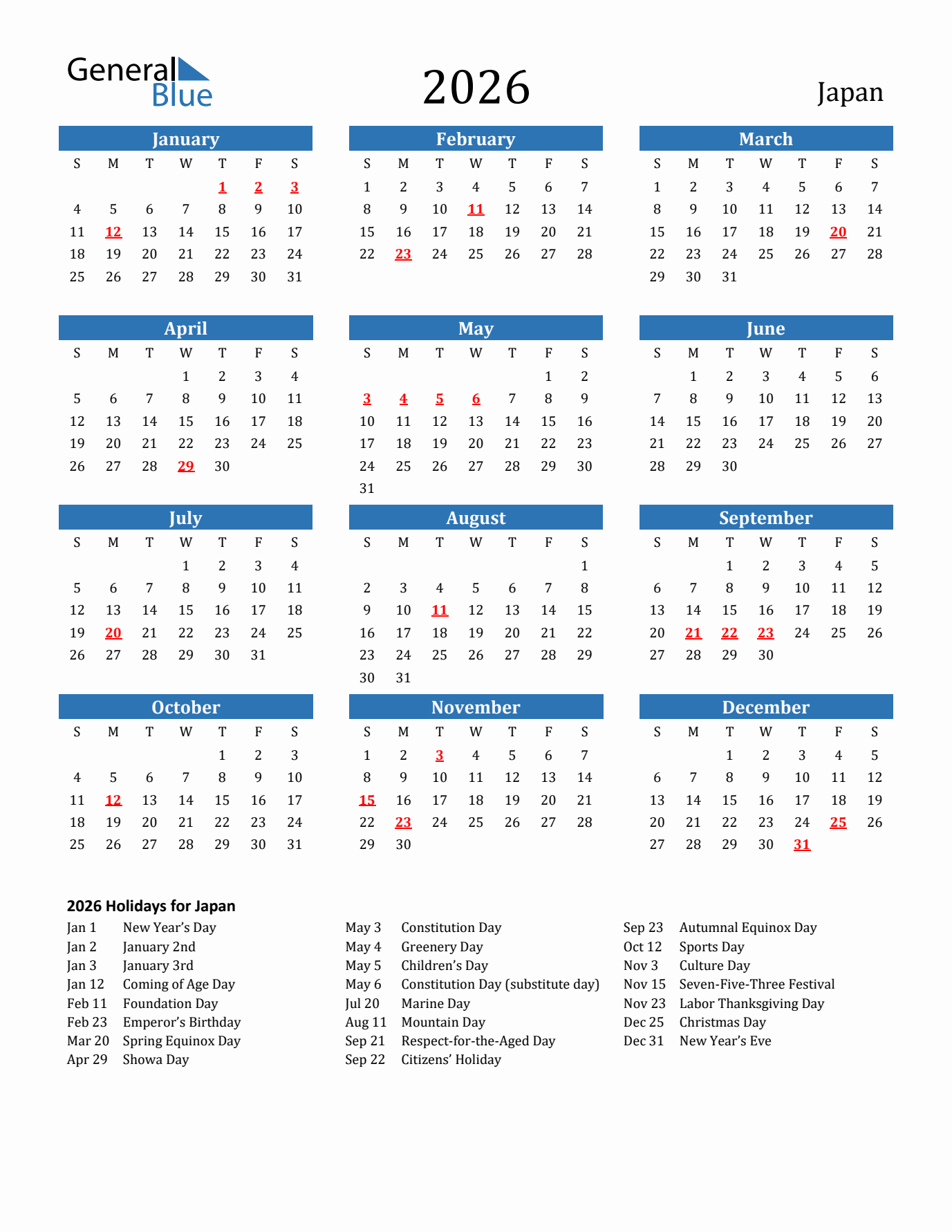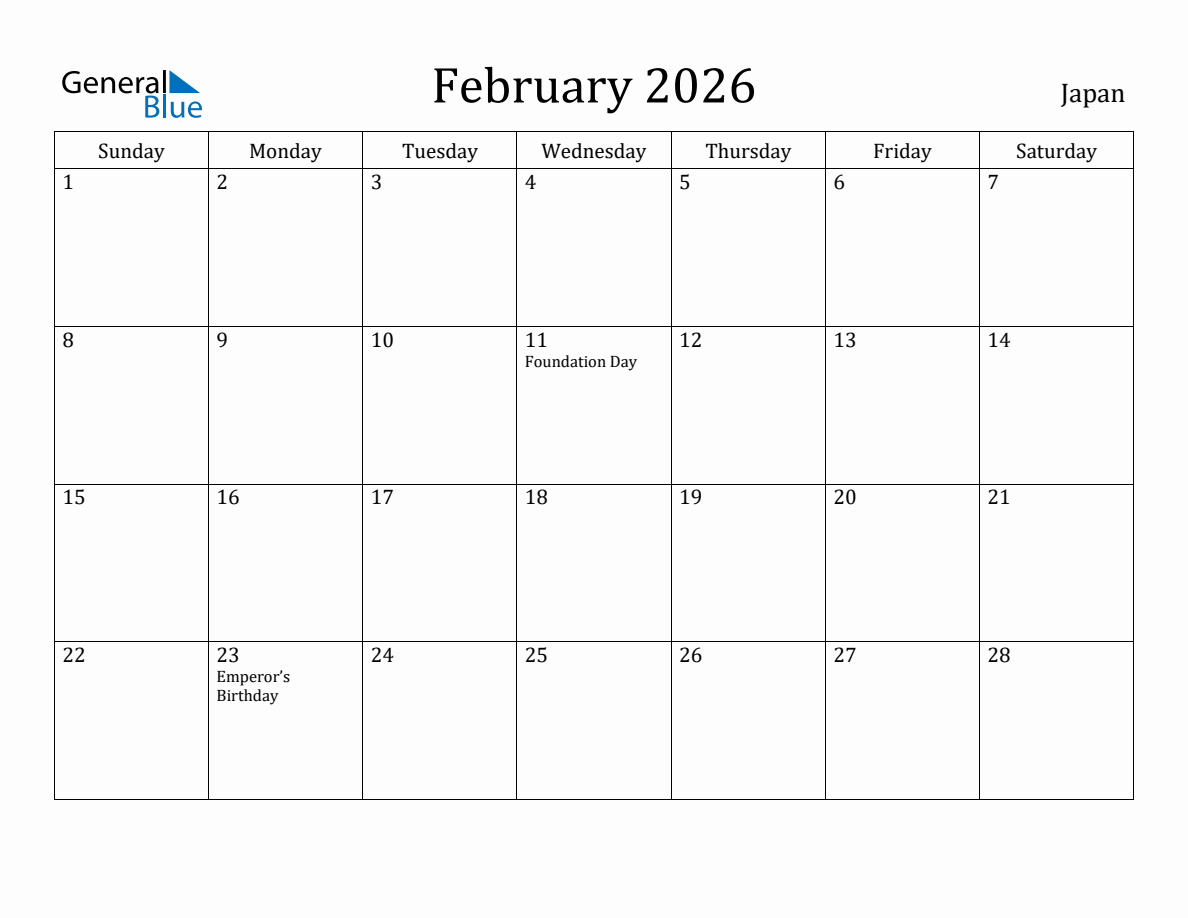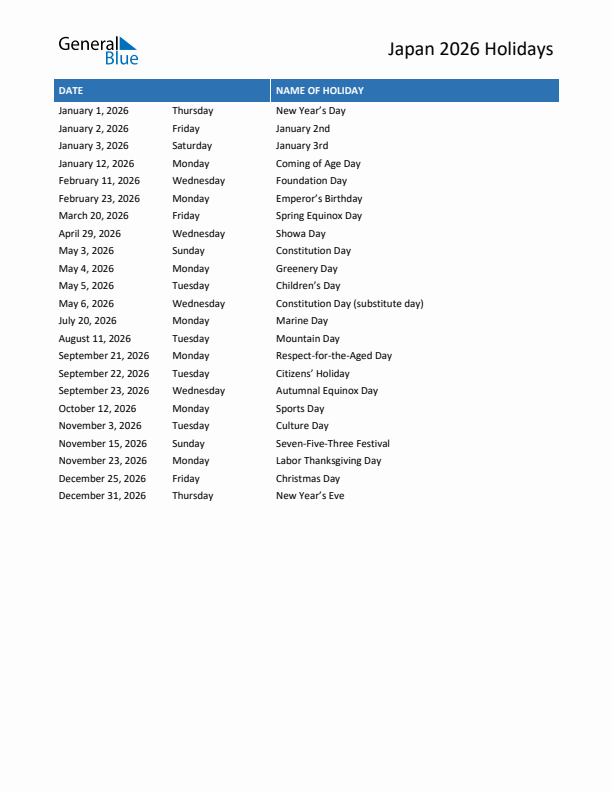Culture Day in Japan
When is Culture Day in Japan?
Culture Day in Japan is on November 3, 2026. It falls on Tuesday.
How many days until Culture Day in Japan?
There are 262 Days left until Culture Day in Japan.
Is Culture Day a public holiday in Japan?
Culture Day or locally known as ‘Bunka no Hi’, is a national holiday observed in Japan every 3rd of November every year. The holiday is celebrated to promote the country’s culture which is done through several arts exhibitions, parades, and awarding of distinguished individuals who have made inspiring academic discoveries and contributions to Japanese culture. For the enjoyment of the public, many cultural-related events are organized during the day.
Since Culture Day is a public holiday, schools and government offices are suspended. However, majority of the businesses continue to operate such as shops, convenience stores, amusement parks, restaurants, and museums. Art, historical, and science museums are in fact, going to be extremely crowded on this day.
Origin of Culture Day in Japan
Prior to the establishment of Culture Day in Japan in 1948, there has been two preceding holidays observed before on the same date. Since the Meiji Period, it has become a part of Japanese culture to celebrate the birthday of whoever the reigning emperor is in the country. It is celebrated as a holiday called Emperor’s Birthday. So, when Emperor Meiji (Mutsuhito) governed Japan from 1868-1912, the country celebrated November 3 as the Emperor’s Birthday, in accordance to his birthdate.
After Emperor Meiji's death in 1912, the holiday was no longer observed on his birthday but was switched to the birthdate of his successor. However, by year 1927, another holiday was established on his birthday. The holiday was called ‘Meiji Setsu’, a day designated to honor the late Emperor Meiji, who is one of the biggest figures in Japanese history. Meiji Setsu holiday was observed since the said year (1927) up until 1947.
From Meiji Setsu to Culture Day
By 1947, following the events of WWII and the creation of Japan’s new constitution (commonly known as post-war constitution), the holiday, together with many other Japanese holidays, was rebranded. The Meiji Setsu was replaced with a new holiday called ‘Culture Day’. Culture Day was established to commemorate the event when the country’s post-war constitution was proclaimed on November 3, 1946. Although the said constitution was implemented and came into effect 6 months later, on May 3, 1947 (the date is also celebrated in Japan as another holiday called Constitution Memorial Day), its promulgation happened at an earlier time, on the 3rd of November, 1946. Hence, to commemorate this event, Culture Day was established. The holiday was then celebrated for the first time the succeeding year, on November 3, 1948. From then, up until the present, its date, and the purpose of its celebration remains the same.
Culture Day Traditions in Japan
Every country has its own share of beliefs, customs, or culture that makes it distinct from others. Japan, which is currently one of the powerful countries worldwide, is definitely rich in terms of history and culture. Every year, the country celebrates a holiday which has the purpose of mainly promoting the nation’s culture, arts, literature, science, and academic discoveries. This day is called ‘Culture Day’. A day to promote peace (which is upheld in Japan’s post-war constitution, also known as Peace Constitution) by means of art and cultural expressions.
Daimyo Gyoretsu (Feudal Lord's Parade)
During the occurrence of Culture Day, many festivities are observed across the country. One of the most famous events is the Daimyo Gyoretsu (Feudal Lord’s Parade in English) held in Hakone, part of the Kanagawa Prefecture. This activity is popular since it’s a rare occasion for one to have a look at several male and female Japanese wearing the beautiful traditional clothes. These people would walk over 6 km in the streets of Yumoto Onsen in Hakone, western part of Tokyo, dressing up like samurai and princesses from the Edo era. These outfits/costumes worn on this day are the traditional clothes (called kimono) commonly used during the Edo Period (1603-1867).
Hakone
At present, the Japanese usually dress up with western clothes, however, the traditional Japanese clothes are still worn during special occasions or ceremonies. One of these special occasions is this parade in Hakone, done during the celebration of Culture Day. Many people would come to witness this festive event which showcases not just the traditional clothing, but also features several entertaining activities. During the parade, performances like archery, dancing, and the enactment of a daimyo (feudal lord’s) procession, are observed. The sight of the marching bands joining the parade and the music coming from it, makes the activity livelier.
Parades and Art Exhibitions
With the celebration of Culture Day, the local and prefectural governments are typically the ones to organize for the various cultural-related activities seen for the entire day. Parades, art exhibitions, and cultural festivals, are the most common events held on this day. Parades are observed throughout the country during the celebration, however, the most popular is the Daimyo Gyoretsu mentioned above. For the art exhibits, these are held in various museums all throughout Japan. These exhibits are mainly organized by the Agency for Cultural Affairs (a special body of the Japanese Ministry of Education, Culture, Sports, Science, and Technology). The country’s art, historical, and science museums and galleries, are expected to get especially crowded at this time of year. What’s fascinating about these museums is that on this day, most of them would offer free admissions for the general population. Thus, many people from across the country choose to visit these museums on this day.
Popular Museums to Visit on Culture Day in Japan
Some of the most popular museums visited during the holiday are as follows:
- The Edo-Tokyo Museum, which showcases artifacts and collections from the Edo period (located in Sumida, Tokyo)
- The National Science Museum (located in Ueno Park, Tokyo)
- The Mori Art Museum (located in Roppongi, Tokyo)
- The Studio Ghibli Museum (located in Mitaka, Tokyo)
- The Hakone Open Air Museum (located in Kanagawa Prefecture)
- The Sapporo Art Park (located in Hokkaido Prefecture)
- And the Fukuoka Asian Art Museum (located in Fukuoka Prefecture).
University-Organized Events
In terms of cultural festivals, schools from nursery to college Universities are the ones that would typically arrange for these events. The Japanese schools would hold their cultural festivals on the same date as the Culture Day, as part of the celebration for the holiday. On this day, the students’ artworks are displayed for the public to see. Bigger Universities would even let their students showcase their outstanding research projects at this time. Friends and families of the students are invited to the schools to have a look at their children’s artistic capabilities. Other people who are interested to visit these festivals are also allowed to enter the schools’ premises. At the same time, public lectures are also being held in some Universities in Japan during the celebration. The Japanese are primarily encouraged to attend to such lectures to expand their knowledge about the country’s history and culture.
The Order of Culture Award Ceremony
The Order of Culture Award Ceremony is another highlight of the Culture’s Day celebration. This ceremony is a prestigious activity held at the Imperial Palace in Tokyo, hosted by the Imperial family. People who have made remarkable contributions to Japan’s culture, arts, sports, technology, literature, science, and other academic-related fields, are acknowledged and given an award on this day. Ikuo Hirayama (an artist), Makoto Ooka (a poet), Seiji Ozawa (a world-renowned conductor), Tadao Ando (an architect), and Issey Miyake (a fashion designer), are examples of some Japanese individuals who had received these awards.
However, the event is not held for the Japanese citizens alone, but, even foreign people who have made extraordinary contributions to the global society are recipients of such awards. These include: the three American astronauts who boarded the Apollo 11 (Neil Armstrong, Michael Collins, and Edwin Aldrin Jr.), who successfully returned from the moon, former US Vice-President Dick Cheney, literary scholar Donald Keene, and many other foreign people who made impressive contributions to the general society. Receiving this award is special on its own, yet, what made the ceremony more honorable is the fact that it was the emperor himself who would present the awards to the recipients.
| Year | Date | Day | Holiday |
|---|---|---|---|
| 2026 | November 03 | Tuesday | Culture Day |
| 2027 | November 03 | Wednesday | Culture Day |
| 2028 | November 03 | Friday | Culture Day |
| 2029 | November 03 | Saturday | Culture Day |
| 2030 | November 03 | Sunday | Culture Day |
| 2031 | November 03 | Monday | Culture Day |
| Holiday | Date |
|---|---|
| Emperor's Birthday | February 23, 2026 |
| Spring Equinox Day | March 20, 2026 |
| Showa Day | April 29, 2026 |
Download or print free 2026 calendar which includes the list of holidays in United States. Free holiday calendar templates in more than 130 countries are provided in PDF, Excel, and Microsoft Word format. For those who like to get a calendar that starts on Monday, we also have ISO calendar.
The February 2026 monthly calendar for the United States shows the holidays for the month, which is helpful in planning schedule and events in reference to the upcoming holidays in the US. It is available in PDF, Microsoft Word and Microsoft Excel formats. You may select your preferred orientation and preferred start of week since we have Monday start calendar or Sunday start calendar.
If you are looking for just a list of holidays in the United States for the year 2026, we have that available in PDF, Word and Excel formats. This can be helpful for those who like to keep track of the holidays, be it for travel, work or any other purposes. It is free to use, just like the rest of our templates. You can choose from Letter, Legal and A4 paper sizes.


